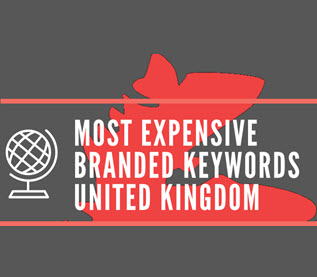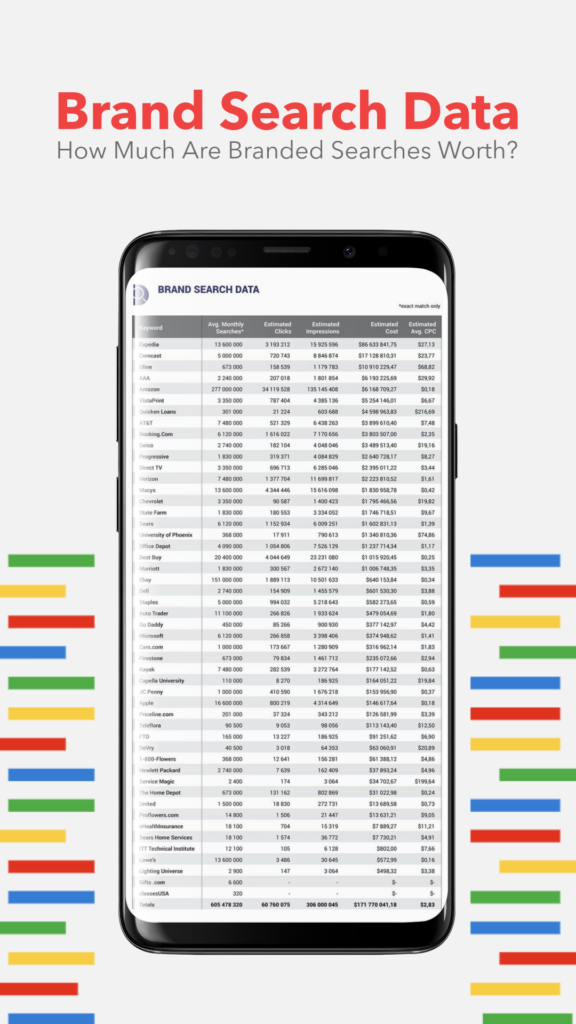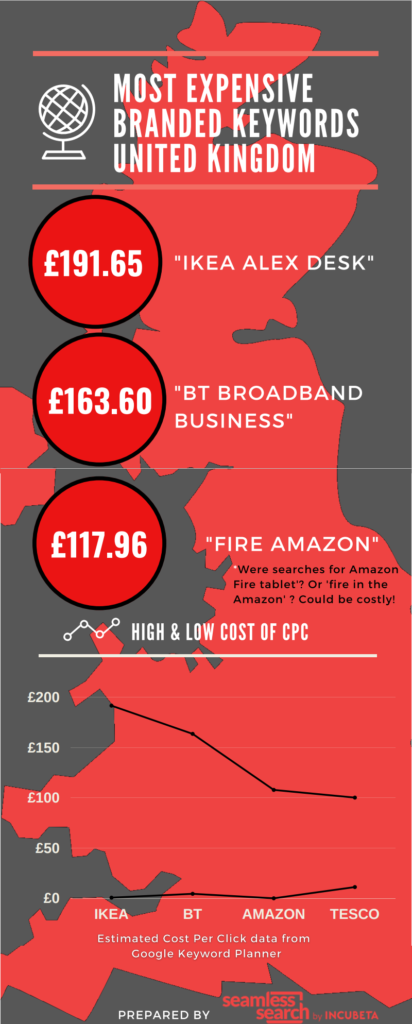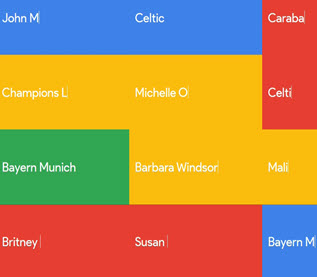
Should I bid for branded keywords
Paying for branded keywords
Do brands need to pay for branded kewords searches on Google Ads? According to Think with Google, digitisation is changing the behaviour of shoppers. They are becoming more specific with their branded searches in order to de-risk their journey to the shops. Not all branded searches result in a trip of course as many people are now buying online.
In Aug 2020 there were an estimated 18.9M branded searches for 1 retailer’s terms from just 644 key phrases. The average CPC was £0.35. The potential cost if every search was a paid ad? £6.6M! Of course, not all were paid ads and Google says competition was high for some terms, which means their competitors were encroaching on their brand.
With the examples in the deck below, do they need to pay for these ads? Would it be better for all, i.e. the brand, Google & the consumer if the paid ads were only served when they were needed? And when they delivered incremental value over organic traffic? The ads for electric fans for example address the consumer need of researching for convenience, largely to minimise risk of disappointment & to get price info.
But does a brand need to pay for ‘near me’ searches? At £0.08 the lower cost per click and over 200k searches in a month, it all adds up!
Multiple-Brands-Should-they-pay-for-this-adHow Much Are Branded Searches Actually Worth?
Estimated data [prepared by Wordstream] for branded keywords for 50 USA companies from Google’s most profitable industries is mind boggling! This is by no means a comprehensive picture of every brand search on Google in the USA, and there are likely some other brands who have more search volume and potentially higher costs. This data is a few years old too, so 2019 and 2020 numbers for the same brands would be very interesting.
These are all exact match estimates from Google’s Keyword Planner, so the global branded keywords search volume for modified versions of these terms would likely be quite a bit higher. The brands themselves would likely have much lower costs per click on these terms (as they’d have very high Quality Scores) Over $171 million per month for just 50 brands – that’s over $2 billion annually.
Did these brands need to spend so much? Were there situations where they were ranking organically in top spots for keywords and did NOT need to pay for the paid ads? Some of the CPC prices for some businesses are astronomical. A coordinated, seamless search marketing campaign, holistically managing both organic and paid search together could reap rewards in savings and increased ROI.

How much trackable web traffic comes from organic vs paid search?
The mixture of organic (40%) and paid search (28%) is still as strong as ever in 2020, with 68% of all trackable website traffic coming from a blend of the two strategies, according to Mediapost. The dominance of organic search is fairly remarkable given the ‘improvements’ that have been made to the search engine results pages (SERPs) layout, which have moved organic results further down the page, giving paid results more dominant positions.
How many clicks are produced by organic search results? Although we all know that the place to be in search results is on the first page, positions one to three are where you really want to be. As seen below, the first three organic places earn more than 50% of the overall click-throughs for non-branded searches. The numbers are even higher for branded searches. This is not unexpected, because branded searches show that the consumer is lower down in the funnel.
Plus, generally, non-branded terms will have more competition with paid ads, which show up first on the SERP, explaining the lower organic CTR for non-branded. Based on these stats should these example brands in the deck below pay for the ads?
trackable web traffic comes from organic vs paid searchInsurance Journal, featured the CEO of a major UK insurance brand 12 months ago
Most conversions at this brand, which helps customers find deals on car & travel insurance etc, come from Google searches. This means that its appearance at the top of search results is critical. Google frequently changs its algorithms, so buying ads, helps secure a top spot in SERPs. And with upto 80% search market share you need to be there on Google.
Insurance companies have to outbid competitors for paid spots even when customers search for their brand. Nowhere is Google’s position more evident than in the market for “branded keywords.” Businesses say that they must buy these ads, whatever the cost because rivals can bid on the keywords. If the insurance org decides not to bid for its own brand, Google can legally sell the ads with its name to a competitor.
“That seems like an odd place to be that I have to bid on my own brand,” said the aforementioned CEO. The price companies have to pay for brand search terms is increasing. If you had a tool to better manage when ads run & bid the least for top spot or not bid at all because you are already there as an organic result, then that would be a game changer.
Insurance-branded-keywords2We looked at the UK’s most loved brands
We looked at the UK’s most loved brands and most valuable brands and did some analysis on their branded searches. For example, a major furniture retailer has a desk where the retail price is £129. According to Google Keyword Planner, a top of page bid in Google Ads for the same product could cost £191.65! Is it even worth bidding on this? The answer of course is no.
Running the branded search for the desk it’s quite clear there are organic listings in top serps positions. However, Google Shopping ads are serving ads for competitors products that are not even the same type of desk. The shopping ads have a picture, price and generally will draw the consumer’s attention.
Were the brand to run a PPC campaign for the desk, setting CPC and CPA ceilings they would most certainly ‘bump’ the competition results down the page. Now, if they could also run the PPC ad for the desk only when it offers incremental value on top of their organic listings. That is, when their PPC ad does NOT cannibalise the organic listing and is not required because there are no competition ads.
Would you agree that this would be a beneficial and valuable feature? Seamless Search is designed to help optimise your search engine marketing holistically and reduce wasted ad spend.



